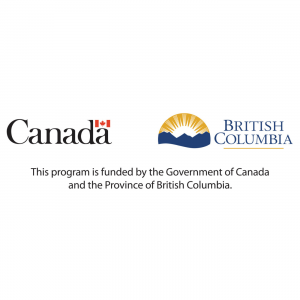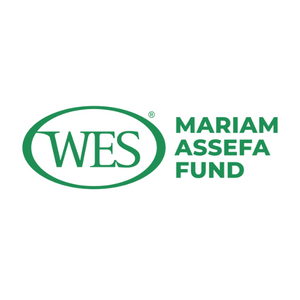Welcome to our first RADIUS at 10 story—part of a new series where we talk with folks from the RADIUS community who were involved with RADIUS at different points spanning a decade. As we turn ten this year, we reflect on what it means to be an evolving, learning organization built by many people. We want to share stories from the folks who helped shape our journey and joined along the way.
We met with Nigerian-born Judith Kambia Obatusa who participated in the Migrant Systems Change Leadership Certificate program (MSCL) last year, offered by RADIUS’ Refugee Livelihood Lab. She hosts Messy Can’t Stop Her, a podcast sharing stories of women’s resilience through chaos, crisis, and life’s challenges. Judith shares openly on her blog and through various published works, including “The Warrior Women Project,” an anthology about the experiences of twenty-two immigrant women living on three continents, and her impending anthology “A Letter To My Darling Husband.”
Journey to RADIUS
Judith first learned about the RADIUS Refugee Livelihood Lab through volunteer work in her community. After an invitation to join the Tri-Cities Local Immigration Partnership’s (TCLIP) Immigrant Advisory Table, a colleague suggested she apply to the RADIUS Refugee Livelihood Lab MSCL program after learning about her deep passion for supporting immigrant communities. This person also happened to be a RADIUS alum, participating in the same Lab program the year prior.
“I was so privileged to be a part of the Migrant Systems Change Leadership Certificate program. As an immigrant to Canada, I've not had an easy ride. The whole reason for my involvement is leaving a legacy of support for others that come after me, whether as a migrant, woman, or parent.”
John Doe
Judith joined the Lab ready to deepen her work with a domestic violence-based initiative called Broken and Braced, which she had started years earlier in Windsor-Essex, Ontario. However, after a few sessions in the lab, she pivoted her focus to families— specifically, immigrants with children.
“My podcast tells the stories of women's resilience because they are the rock in a family. The hand that rocks the cradle rules the world. A woman who is healthy, will flow that wellness into her family. If she knows who she is, she’ll know her boundaries. The boundaries that cannot be crossed. She'll know what fills her up, and what she doesn't want. By knowing this, she's a better mom, a better partner, and a better citizen. My idea is to have spaces where we can talk and have workshops and events to build family resiliency. A safe place where families identify what they may be doing or not doing that impact their families negatively.”
John Doe
Challenges and Hard Truths about Immigrating to Canada
Judith moved to Canada eleven years ago, first to Windsor-Essex, Ontario as a skilled immigrant; an experience she describes involving appraisal, scrutiny, and high costs.
“You feel that you're coming because you merit it, and they need your skill—then you come here and start from zero.”
John Doe
Four weeks after arriving in Canada, tragically, her father passed. He was her only parent and best friend since the age of six. Shortly after that, while grieving this hardship, Judith’s family experienced racism in the school system; physical violence and institutional harm inflicted when child welfare services got involved. That experience opened Judith’s eyes to real systemic racism and influenced her decision to join the Parents Advisory Council in her children’s schools.
Often the only Black woman in these spaces, she was fiercely committed to using her voice in the systems that would be making decisions in the lives of her children and family.
Judith moved to B.C. in 2020, and continued her tireless dedication to volunteer work through her children’s school and District School Board’s Parent Advisory Council as well as TCLIP’s Immigrant Advisory Table.
Learnings in the Refugee Livelihood Lab
Judith felt the Lab took time to address the concepts around one’s relationship to land deeply and authentically. As an immigrant settling in Canada, reckoning with that identity concerning Indigenous Peoples and the land in Canada is essential. Territorial Acknowledgements are something she’s noticed performed in a clinical and prescriptive way, but not in the Refugee Livelihood Lab.
“It's very emotional for me because I am Nigerian-Canadian. My country was colonized by the British, the same British [that Colonized Indigenous peoples in Canada]. RADIUS explained the process [of land acknowledgements] and helped us see how we could see ourselves in the acknowledgement so that we are not one of those people who do it for duty's sake. We do it because we understand where we are in the picture. That was very eye-opening for me.”
John Doe
The Evolution of Social Innovation
Judith sees a change in the social innovation field, where before, organizations might identify a problem and look to solve it before speaking to those most impacted. Now, there is more co-creation. Social change organizations are working with communities to identify problems, asking for their expertise and experiences, and bringing forward their expertise to support.
“What spaces like RADIUS are doing for us now is giving us a safe space to be ourselves. To be comfortable in our skin. Safe spaces also give us the impetus to go out there and step up. Like I always say, step up to the podium of your life.”
John Doe
Words to Future Cohorts
“If you sign up to be part of the program, give it your all. Don’t take a space from someone else if you aren’t fully committed.”
John Doe
What’s Next for Judith?
Judith applied for the Refugee Livelihood Lab’s Trampoline: Ideas into Action! Program launching next month. Trampoline is a twelve-week program that supports participants in moving their project forward.
“I've been thinking about how to continue my project from where MSCL stopped. With Trampoline, I can get the support to bring my dream to reality. I am very grateful for the opportunity this gives me to keep doing what I do—showing up. We doubt ourselves. Others doubt us. But what I found is, no matter how much doubt we face, the bedrock of success is consistency. So, I’ll just keep going.”
John Doe
Her anthology, “A Letter To My Darling Husband”, a collection of true letters from women to their loves, ex-loves, and future loves, will be available soon. Proceeds will go to W.I.N.G.S, Women in Need Gaining Strength. WINGS operates transition houses and other programs for women and children impacted by domestic violence.
You can find Judith on social media at @judithobatusa
The Refugee Livelihood Lab is part of a growing movement supporting deep shifts in the systems which govern our lives towards equity, dignity, and sustainability for all people and the planet.
Thank you to our funders Ministry of Social Development and Poverty Reduction, and WES Mariam Assefa Fund (MAF).



